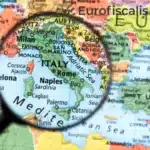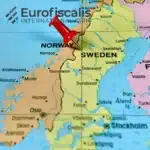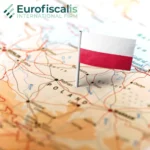When & How to get a VAT number in France: 2025 guide
A VAT number in France is mandatory for any business involved in taxable supplies within the country. This includes local sales, importing goods, storing stock for fulfillment (like with Amazon FBA), or engaging in intra-Community transactions. Without it, you simply cannot operate in compliance with French and EU VAT regulations.
You can obtain this identifier through the online VAT registration on official INPI portal (which forwards the request to the SIEE, the tax office for foreign companies) or by appointing a tax representative in France. The number follows a specific structure: FR XX YYYYYYYYY | FR12 123456789, where the last nine digits correspond to your unique company ID, the SIREN number France.
This guide breaks down exactly when you need a French VAT number and the precise steps to secure it.
📍 Où es-tu ? :
- Published :
- Reading time :
- Updated : 22/07/2025
Diagnostic Quiz: Do I Need a French VAT Number?
- Purchasing goods from another EU country to be received in France?
- Selling goods from France to a business customer in another EU country?
- Importing goods into France from a non-EU country?
- Purchasing goods in France to resell them within France?
The essentials to know about the French VAT number in under a minute:
Format and Purpose: It is your unique tax identifier for any taxable operation in France. Its format is strict: the letters FR, a 2-digit computer key, and your 9-digit SIREN number.
Who is Concerned: Registration is mandatory from the first euro if you store goods in France (including via Amazon FBA). It is also required for intra-community B2B trade or if your B2C distance sales in Europe exceed €10,000 per year.
Key Difference: Do not confuse it with the SIREN (which identifies your legal company entity) or the SIRET (which identifies a specific establishment). The VAT number is exclusively for tax management and trade within the EU.
How to Get It: EU-based companies can apply online through the INPI portal. Those from outside the EU have a legal obligation to appoint a fiscal representative to assist them.
Major Benefit: It offers a significant cash-flow advantage. Thanks to the import VAT reverse-charge mechanism, you no longer have to pay VAT upfront to customs when importing your goods into France.
What is a VAT number in France?
A VAT number in France, officially known as a “numéro de TVA intracommunautaire,” is a unique tax identifier. It is assigned by the French tax authorities to both French and foreign companies that conduct taxable business operations in France. This number is your key to managing Value-Added Tax France, allowing you to legally issue invoices, VAT return filing, and engage in trade within the European Union.
What does a French VAT number look like (format, example)?
The VAT number format France is consistent and directly linked to a company’s core French business identifier. It is structured as follows:
- FR (Country code for France)
- XX (A 2-digit computer-calculated key)
- YYYYYYYYY (The company’s 9-digit SIREN number)
For example, a valid French VAT number would look like this: FR 24 389271899.
What are the differences between SIREN, SIRET, and VAT numbers?
It’s a common point of confusion for foreign businesses, but these three numbers serve very different purposes. While they are linked, they are not interchangeable. Think of them as different layers of identification for your business activities in France.
Here’s a clear breakdown to distinguish your French VAT ID from other business numbers:
| Identifier | Format & Definition | Primary Use |
|---|---|---|
| SIREN | A unique 9-digit number issued by INSEE (the French National Institute of Statistics) that identifies the company as a whole legal entity. It never changes throughout the company's lifespan. | Used for all official and administrative interactions with French authorities. It must appear on all official company documents. |
| SIRET | A 14-digit number composed of the 9-digit SIREN + a 5-digit NIC (Numéro Interne de Classement). The SIRET number identifies a specific physical establishment or branch of a company. A single company can have multiple SIRET numbers if it has multiple locations. | Used for location-specific administrative, tax, and social security purposes. A new SIRET is issued if an establishment moves. |
| VAT Number | FR + 2 digits + 9-digit SIREN. This is your tax identifier specifically for VAT purposes. | Essential for all cross-border VAT transactions within the EU, issuing VAT-compliant invoices, and filing VAT returns. |
Ready to start your business activities in France without the administrative headache? Let our team of experts handle the entire registration process for you. We manage the paperwork and secure your official French VAT number in 40 days.
Who needs a VAT number in France?
Essentially, any business—whether based in the EU or not—that performs activities subject to French VAT must complete a foreign company VAT registration. Achieving VAT compliance in France is not just for domestic entities; it becomes a requirement the moment your operations touch French soil in a taxable way.
You will need to register for a French VAT number if your company performs any of the following activities:
- Importing goods into France from a non-EU country or, conversely, exporting goods from France.
- Making Intra-Community acquisitions of goods in France. This happens when you buy goods from a company in another EU member state and have them shipped to France.
- Making Intra-Community supplies of goods from France to a business customer in another EU country.
- Storing goods within French territory with the intent to sell them. This is a critical trigger for e-commerce sellers and includes using your own warehouse, a third-party logistics partner (3PL), or a fulfillment program like Amazon FBA.
- Selling goods to French consumers (B2C) and exceeding the single EU-wide distance selling threshold of €10,000 per year, particularly if you have chosen to register for VAT in France to handle your obligations. This is a core part of e-commerce VAT obligations.
- Providing certain services where the place of supply is deemed to be France. This typically includes services related to real estate located in France or tickets for events held in France.
- Selling goods under DDP (Delivered Duty Paid) Incoterms to customers in France. In this scenario, you, the seller, are responsible for customs clearance and paying the import VAT, which necessitates having a French VAT number.
How to get or register for a French VAT number?
The VAT registration process in France differs slightly depending on whether your company is established within the European Union or outside of it. However, the goal is the same: to get your file to the correct department of the French administration for VAT, which is the SIEE (Service des impôts des entreprises étrangères) in Noisy-le-Grand.
Obtain a VAT ID in France For Companies in the EU
If your business is headquartered in another EU member state, your application for a French VAT number is now centralized through the online VAT identification process portal of the INPI (French National Institute of Industrial Property). This official gateway will then transmit your file to the SIEE for processing.
To ensure your application is complete and processed smoothly, gather the following documentation for VAT registration:
- The official form: This is the EEO form (“Enregistrement des Entreprises Étrangères Opérant en France”), known as CERFA 15928*01. Fill it out carefully.
- Your company’s articles of association: You’ll need an up-to-date copy, and crucially, an official French translation. This is a common point of delay if forgotten!
- Proof of company registration: The equivalent of your domestic business register extract. Be careful, this document must be dated less than 3 months prior to submission.
- ID of the legal representative: A copy of the passport or national ID card of the company director.
- Proof of activity in France: A document justifying your need for a VAT number. This can be a first invoice issued to a French client, a signed purchase order, or a contract proving you are about to conduct taxable operations in France.
- Power of Attorney: If you have hired a tax agent to handle the process, you must include the signed mandate authorizing them to act on your behalf.
Regarding the VAT registration timeline in France, you should typically expect to receive your number within 40 days, depending on the SIEE’s current workload.
My advice: As soon as you receive your French VAT number, don’t delay! Your immediate next step should be to create your professional account on the official impots.gouv.fr website. This is essential, as it’s the only way you can file your periodic French VAT returns online.
For Non-EU Companies: With a Fiscal Representative in France
For companies established outside the European Union, the rules are stricter: you are required to appoint a fiscal representative in France. French law is unequivocal on this point; without one, a non-EU company cannot register for French VAT.
Why? The fiscal representative France acts as a guarantor to the French tax authorities, ensuring your VAT obligations are met and being jointly liable for the payment of your VAT.
To get your French VAT number, your representative will need a well-prepared file. While many documents overlap with the EU process, there are critical additions, including the official mandate and a bank guarantee.
Here is what you will generally need to provide to your representative:
- The same core documents as an EU company (Official EEO form, translated articles of association, recent proof of registration, director’s ID, proof of activity).
- The Fiscal Representation Mandate: This is the key legal document that binds you to your representative and officially authorizes them to handle all VAT matters on your behalf with the French tax authorities.
- A Bank Guarantee: This is the major difference for non-EU businesses. The tax administration typically requires a financial guarantee to cover any risk of unpaid VAT. The amount is determined based on your projected activity and client base (B2B and/or B2C).
A note on the timeline: Expect the process to take a bit longer than for an EU company. Before even submitting your VAT registration file, your representative must first obtain their own accreditation from the SIEE to specifically represent your company. This preliminary step can add several weeks to the overall timeline.
What are the uses and legal obligations of holding a VAT number in France?
Obtaining a French VAT number is not the end of the journey; it’s the beginning. It unlocks the ability to trade compliantly but also comes with specific VAT obligations in France. Understanding these duties—and the significant advantages they unlock—is key to managing your business effectively.
VAT Return in France
Once your number is active, all your taxable transactions in France must be reported. This is done through the French VAT return, known as the CA3 declaration. The process of VAT return filing is generally done monthly via your professional account on the impots.gouv.fr website.
You can find a detailed breakdown of this form in our complete guide to the French VAT return.
ESL and INTRASTAT in France (ERTVA & EMEBI)
If you conduct cross-border VAT transactions with other EU countries, you have additional reporting duties. Two key declarations, ERTVA (the French equivalent of an EC Sales List or ESL) and EMEBI (the statistical survey replacing Intrastat), must be filed. These are also typically filed monthly on the customs portal, pro.douane.gouv.fr, and summarize your intra-community movements of goods.
To understand how these work and the specific thresholds, please refer to our article on Intrastat in France.
VAT Refund in France
A major benefit of having a French VAT number is the ability to deduct the VAT you pay on your business expenses (input VAT). This deducted amount is offset against the VAT you collect on your sales. If you are in a VAT credit position (meaning you’ve paid more VAT than you’ve collected), you can request a VAT refund in France.
Under certain conditions, if you are consistently in a VAT credit position, you may even be eligible for a VAT-exempt purchasing authorization, known as the “contingent d’achats en franchise”.
Read our dedicated article to explore all the ways to get a VAT refund.
Import without VAT in France
France offers a powerful cash-flow advantage to VAT-registered businesses through the mandatory import VAT reverse-charge mechanism. Since 2022, any company with a French VAT number does not physically pay VAT to customs when importing goods into France. Instead, the VAT is accounted for directly on the CA3 VAT return.
My advice This is a game-changer for cash flow. You declare the import VAT as both collected and deductible on the same VAT return, resulting in a net-zero cash impact. This quasi-unique system in the EU means your funds aren’t tied up waiting for a refund, giving you a significant operational advantage.
Learn how to master this system in our guide to importing into France without paying VAT.
Ready to start your business activities in France without the administrative headache? Let our team of experts handle the entire registration process for you. We manage the paperwork and secure your official French VAT number in 40 days.
FAQ on the French VAT Number
Here are answers to some of the most common questions we receive about handling VAT in France.
The threshold, according to the most recent legislation, is €34,400 for services and €85,800 for goods sales.
For EU distance selling VAT rules, the key threshold is €10,000 per year for all your EU sales combined. However, if you store goods in France (e.g., using Amazon FBA), there is no threshold; you must register for VAT from your very first transaction.
The VAT filing deadlines for the monthly CA3 return are a crucial date to remember. You generally have until the 24th of the month following the reporting period to file your return and pay any VAT due. For example, your VAT return for January activities must be submitted by February 24th.
You can officially check the validity of any EU VAT number, including a French one, by using the official VIES VAT validation tool provided by the European Commission. We also offer a free tool connected directly to the VIES database for quick VAT number validation.
France applies several VAT rates in France, depending on the goods or services. The main rates are:
- 20%: The standard rate applicable to most goods and services.
- 10%: A reduced rate for sectors like restaurants, passenger transport, and certain renovation work.
- 5.5%: A further reduced rate for essential goods like most food products and books.
- 2.1%: A super-reduced rate reserved for specific items like certain press publications and medicines.
The VAT payment requirements differ based on your company's location.
- EU-based companies pay their VAT directly via bank transfer through their professional account on the impots.gouv.fr website.
- Non-EU companies make their VAT payments to their appointed fiscal representative, who is then responsible for remitting the funds to the tax authorities.
Your official French VAT number is issued on a document called the "Mémento Fiscal" (VAT certificate) by the tax office (SIEE) once your registration is complete. You should keep this document in your records and ensure the number is correctly stated on all your sales invoices issued to business customers.
Ready to start your business activities in France without the administrative headache? Let our team of experts handle the entire registration process for you. We manage the paperwork and secure your official French VAT number in 40 days.
Business développeur chez Eurofiscalis, j’ai pour objectif de simplifier et vulgariser les règles de TVA pour les e-commerçants et les sociétés s’exportant à l’international. Je sais combien cela peut être complexe et fastidieux, et je suis convaincu que mon expérience et mes connaissances peuvent aider les entreprises à comprendre et à respecter les réglementations fiscales en vigueur.





















